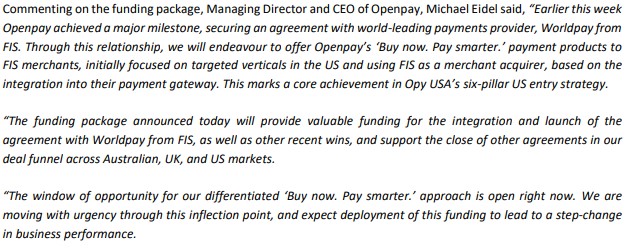Director Trades: Are they a good or bad sign? Here’s what investors should read into them
Nick Sundich, June 3, 2024
Director trades – either purchases or sales – are taken by investors as a sign of confidence (or a lack of confidence) in the company. But just how much should you read into it?
Investors must remember these points about director trades
First of all, we would note that director trades should be just one of many factors that investors consider when making a decision about investing in a company. Secondly, there might be other reasons behind director purchases or sales. Third, there are rules directors must follow before trading. Obviously, like everyone else, they cannot trade when in possession of inside information. But companies will often set ‘black out periods’ during which directors cannot trade at all – often the few weeks before reporting season.
Companies may also have policies to seek board approval before any trade at all. Some may even have policies for directors to buy shares, especially new ones who may have little or no skin in the same. With those considerations raised, we will address the question of what investors should read into it.
Are director purchases as a good sign?
If directors of a company are buying shares in their own company, it can generally be seen as a positive sign. After all, they wouldn’t be buying if they were not confident. Furthermore, they are aligning their interests with those of the shareholders, as their personal wealth is also tied to the company’s success. This can lead to greater accountability and decision-making that is in the best interest of both the company and its shareholders.
But to state the bleeding obvious, it is by no means a guarantee that companies will gain. There’s no shortage of companies that have gone bust despite directors buying. For example, Openpay (ASX:OPY) went bust less than 2 years after then directors Yaniv Meydan and Michael Eidel bought $4m and $200,000 respectively at over $2 per share. There was a ‘step-change in business performance’ alright, but not in the direction the company hoped for.

Then Openpay (ASX:OPY) CEO Michael Eidel commenting on the aforementioned capital raising (Source: Company)
Even if you wanted to view all director buys as a sign of confidence, with so many buying and selling – how can you tell which ones are most likely to gain? In our view, you should only place any value on director purchases when above $200,000 per director. You should place a stronger weight when there are multiple directors buying at once. And of course, you should do your own research on the company’s fundamentals before making any decisions on a company.
Are director sales a bad sign?
Simply put, yes. Director sales can be viewed as a sign of concern or lack of confidence in the company’s future prospects. As a consequence, these usually result in a decrease in the company’s shareprice as well as a sense of distrust among stakeholders, especially if the sell-off is not accompanied by a clear and transparent explanation.
Directors may mitigate the damage by transparent about their actions and provide clear explanations when selling shares. Sometimes there are legitimate reasons for selling shares such as to meet tax or legal bills. Bevan Slattery once sold $500k in Megaport shares to help victims of the 2019-20 bushfires. Some directors might give the reason as something along the lines of ‘diversifying their portfolio’. This should be treated with scepticism – wouldn’t they sell other assets before their own company if they truly thought their company was valuable and/or had potential to be?
Some director sales may be to institutional fund managers. You may take this as a sign of confidence by those institutional fund managers, although of course it is a case of buyer beware. Remember Zoonoo (ASX:ZNO), that company that made sanitisers and went from 9c to over $3 during the pandemic? Its then boss Paul Hyslop sold NZ$23.2m in shares to Regal Funds Management in March 2020 at $1.38 per share.
Director trades can be useful, but can’t be the only thing investors consider
As an investor, it can be tempting to read into director trades as a potential signal for the direction of a company’s future performance. However, it is important to approach this information with caution and take into consideration several other factors – particularly the overall financial health and performance of the company, as well as the broader economic and market conditions.
Director trades alone should not be the sole factor in making investment decisions. While director trades may provide some insights into a company’s future prospects, it is important to approach this information with caution and take into consideration several relevant factors before making investment decisions.
What are the Best ASX Stocks to invest in right now?
Check our buy/sell tips
Blog Categories
Get Our Top 5 ASX Stocks for FY25
Recent Posts
Here’s why Rich Lister WiseTech boss Richard White ‘stood down’, and how the A$30bn+ cargo software giant may be affected
WiseTech boss Richard White has been viewed as a key reason for his company’s success over its 30-year history and…
Is the S&P 500 Really Doomed to a ‘Lost Decade’? Goldman Sachs thinks so, but will it eventuate?
The term ‘Lost Decade’ gets thrown about a lot, but most recently to the next decade to the S&P 500.…
Halloween Stocks: Here are 5 ASX Stocks that Will Benefit from Halloween
Here are 5 ASX Halloween Stocks! The Reject Shop (ASX:TRS) The Reject Shop is one of Australia’s most notable…




